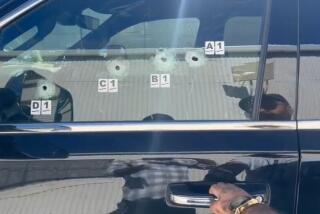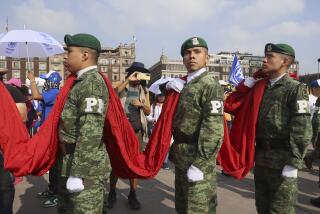Newspaper Guarded in Warlike Election Campaign : Punjab Editor Fears He’s a Target
- Share via
JALANDHAR, India — Editor Vijay Kumar Chopra moves about his newsroom with a pistol in his right hand. The room is darkened by a protective lead screen along the line of windows. Outside, several of the 30 policemen assigned to guard the premises peer out at visitors from sandbagged machine-gun nests.
In this atmosphere, Chopra puts out his newspapers, which these days are heavy on election campaign coverage. He carefully selects photographs of the candidates, accepts or rejects press releases, approves editorials.
On Wednesday, the state of Punjab will have its first election in five years, and the contest has become a two-way battle between the Congress-I Party of Prime Minister Rajiv Gandhi and the Akali Dal, the main party of the state’s 8-million-plus Sikhs.
Banners, Frenzied Revelry
In India, election time is traditionally a time of festival. Colorful banners go up, and voters are harangued by sound trucks moving through the streets. There is much frenzied revelry, which seems fitting in the world’s largest democracy.
To some extent, that sort of spirit is evident in Punjab. The sound trucks are here, and posters are everywhere--mostly bearing pictures of Gandhi and the late Sikh leader Harchand Singh Longowal, who was assassinated last month.
In other ways, though, this is more like a war than an election.
The candidates travel the narrow country roads in convoys of five and six cars, with carbines protruding from the windows. Between 85,000 and 120,000 soldiers and policemen have been ordered to the state to maintain order; the Central Reserve Police, the Provincial Armed Constabulary, the Border Security Force and the regular Indian army are all represented.
Monday, on the final day of campaigning, three children were killed in a terrorist bombing that was apparently aimed at three Congress-I political leaders in the border district city of Batala, Indian news agencies reported. Police said there were seven bomb explosions in the state during the day.
Under Indian law, no campaigning will be permitted today, the day before the voting.
Police said the three children, all girls under 10 years old, were killed as they played near an automobile being used for campaigning by three Congress-I Parliament members in Batala. The politicians were taking a break away from the car when the incident occurred.
Police in Punjab’s state capital at Chandigarh warned Monday night that terrorists were using plastic “tiffin” boxes--Indian-style lunch pails--to hide explosives and warned citizens against touching unfamiliar objects.
Cycle of Violence
An Indian news magazine, in a headline reflecting the political as well as the physical ironies of the moment, called it an “Election Under the Gun.” For this election is being held in the hope that it will end a cycle of violence that has raged here for four years, beginning with the assassination Sept. 9, 1981, of Lala Jagat Narain.
Narain was a noted Punjab Hindu who, during the struggle for independence from Britain, spent eight years in prison. After independence in 1947, he came to Jalandhar (formerly Jullundur) and founded the Hind Samachar newspaper group, which publishes editions in the Hindi, Urdu and Punjabi languages.
As an outspoken editor and political figure, Narain became the symbol of Hindu interests in Punjab, which is about 55% Sikh and 45% Hindu. Because of his outspokenness, he was the first target of Sikh terrorists seeking to drive the Hindus out of Punjab and to create a separate Sikh state.
Son Slain by Sikhs
Almost three years later, his son, Romesh Chandra, who had taken over as editor of the newspapers, was also killed by Sikh terrorists.
Now it is Vijay Kumar Chopra, 53, Narain’s second son and Chandra’s brother, who edits the Hind Samachar newspaper group. Near his office are the offices of two nephews, who also carry pistols and wear bulletproof vests.
“The terrorists wanted that we should run away from this place,” Chopra said. “Because we are the largest circulated dailies in the north, they hate us.”
Chopra’s newspapers continue to represent Hindu interests in Punjab and to attack the fundamentalist Sikhs. And he and his family continue to be targets of the terrorists. The family has not left the protective cordon surrounding their home and office in 16 months, Chopra said.
International Hate Mail
Every day, he said, he gets another batch of hate mail, some of it from the United States, Canada and Britain.
“The letters say, ‘You have written this, and now you are finished.’ ” Chopra said. “They are so dirty. They say, ‘We will lift (kidnap) your girls and . . . your beautiful wife. We will shoot your sons and chop them into pieces.’ ”
Chopra does not believe that the violence in Punjab will end with the election, even if the Sikh’s Akali Dal Party wins a majority of the seats in the state’s legislative assembly.
“Terrorism will go on,” he said. “It will not stop for either the Congress (Party) or the Akalis.”
Still, he is prepared to stay and continue to publish. “If we fold down,” he said, “than we have served the purposes of the terrorists.”
Concerned About Future
Chopra worries that something will happen to him before he can train his son and the two nephews (sons of his slain brother) in the process of putting out three newspapers in three languages.
“None of the boys can read Urdu,” he said. “I guess I will be the last of that breed.”
Then he added, with a note of sadness in his voice, “The boys are so young. If it is possible, I would like to hand the responsibility to them, but they have just joined the business. They are being taught so they can keep this institution alive.”
More to Read
Sign up for Essential California
The most important California stories and recommendations in your inbox every morning.
You may occasionally receive promotional content from the Los Angeles Times.













